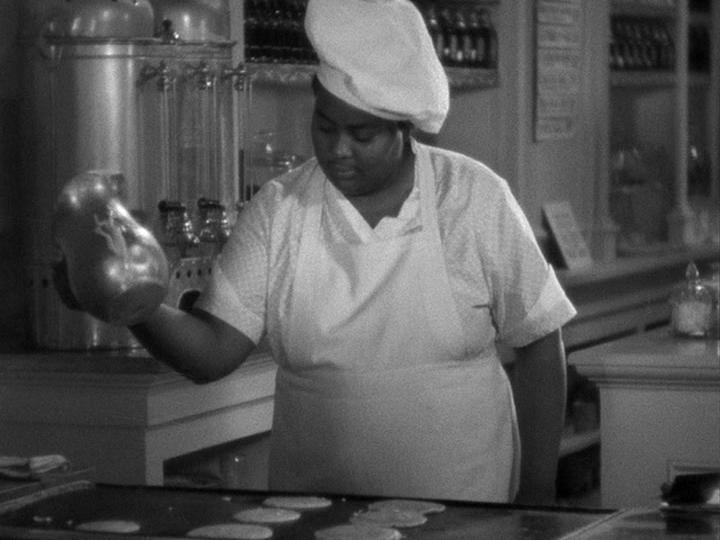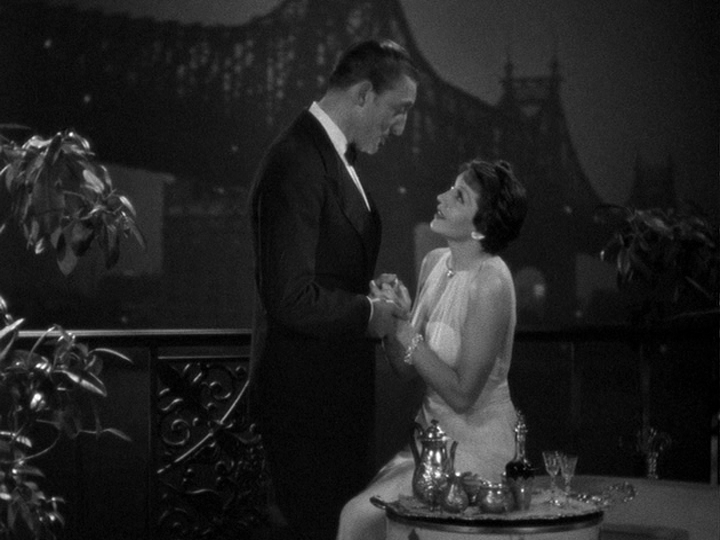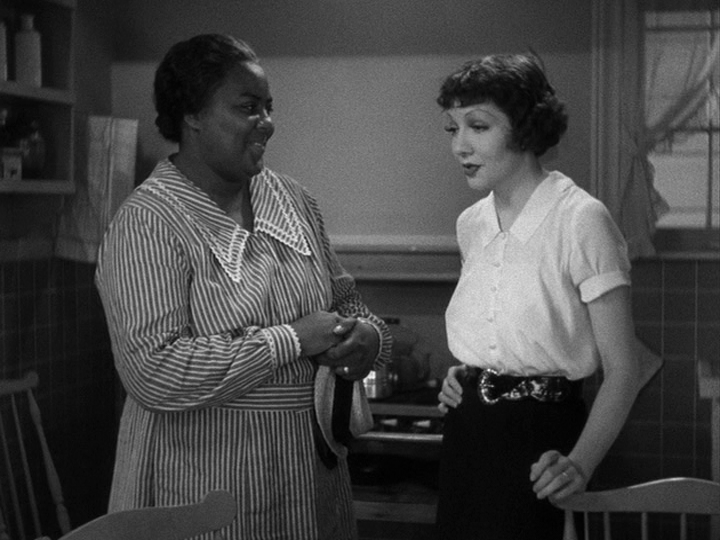Note: unlike most of my reviews, this one contains a spoiler.
Imitation of Life, 1934, Universal Pictures. Starring Claudette Colbert, Louise Beavers. Directed by John M. Stahl. B&W, 111 minutes.
Bea Pullman (Claudette Colbert) is a widow struggling to make ends meet by continuing with her husband’s business of selling maple syrup. In addition to the demands made on her as a businesswoman, she has a toddler daughter, Jessie, who is a handful.
One day she answers a knock at her door and finds Delilah (Louise Beavers), a black woman seeking work. She has the wrong address, and when Bea suggests she take the trolley to the correct place, Delilah gently reminds her she’s not allowed on the trolley. Bea invites her in for a cup of coffee, and while she continues to struggle to get Jessie dressed, Delilah prepares breakfast for the two of them.
Eventually, Delilah convinces Bea to take in both her and her daughter Peola, promising to work for room and board. Peola is surprisingly fair-skinned given her black heritage, and it soon becomes evident she is able to “pass,” that is, pass as white.

Louise Beavers
Bea is industrious and innovative, and when she tastes Delilah’s pancakes, made from a family recipe, she opens a storefront café featuring Delilah in the front window at the griddle. The café becomes immensely popular, allowing Bea to pay off the debts she incurred to open it as well as provide for the four of them.
It’s when a passerby suggests they package the food that their fortunes truly turn, and “Aunt Delilah’s Pancake Flour” makes them all rich, although Delilah refuses to touch her part of the wealth. She asks only for a splendid funeral.
Both women have their struggles with their daughters, however. Jessie (Rochelle Hudson) is flighty and undisciplined, and Peola (Fredi Washington) refuses to admit to being black (or “colored”). She easily passes for white at school until Delilah shows up and exposes her secret. Later, as a young adult, she fights the idea of going to a blacks-only college. In the meantime, Jessie has fallen for her mother’s beau, Stephen Archer (Warren William), something both Stephen and Bea are initially unaware is happening.

Louise Beavers, Fredi Washington
Peola has reluctantly gone on to college, but soon drops out. She takes a job in a whites-only restaurant until her mother shows up and exposes her secret. Later at home, in her anger, she tells her mother she is leaving, planning to pass in a white world. Her departure breaks Delilah’s heart.
Delilah takes to her bed, mourning the loss of Peola. Bea and Jessie are at a loss with how to help her, short of bringing Peola home. That isn’t a possibility, and Delilah eventually dies of a broken heart.
It’s at her magnificent funeral that Peola returns, throwing herself on her mother’s casket, in pain knowing she caused her death.
Not long after the funeral, Bea breaks off her engagement to Stephen, saying she will come back to him once Jessie is over her infatuation. Mother and daughter walk arm-in-arm, reminiscing over the time Delilah and Peola first came into their lives.

Warren William, Claudette Colbert
Imitation of Life was nominated for three Academy Awards, including Best Picture. It won none, but credit should be given to the producers and the studio for their struggles with the new Production Code, which objected to the idea of the interracial relationship somewhere in Peola’s ancestry that would have led to her fair skin. Further credit should be given for casting Fredi Washington, who in real life was of European and African-American heritage.
It’s beyond the scope of my abilities to comment on the cultural aspects of this story, but given the era in which this movie was made, it strikes me as being ahead of its time in its message. Yes, Delilah is a stereotypical “Mammy” and Bea at times appears to be condescending to her. Other times, however, it is evident that Bea recognizes Delilah’s contribution and wants her to be a full partner. And in the end, the leveling field is that of motherhood.

How amazing!:))) Also I just watched the 1959 version on tv about a week ago:)))
LikeLiked by 2 people
I plan to watch that soon!!
LikeLiked by 1 person
I didn’t know there was another, earlier one, until now! I like Claudette Colbert, so thanks for the tip!
LikeLiked by 1 person
It’s good. Not maudlin, and there are some things you wouldn’t see today (but seriously, there are some things we see today that audiences will shake their heads at. Don’t know what they are, but that’s the nature of progression). If you like Claudette Colbert, you’ll like this movie.
LikeLiked by 1 person
[…] via Imitation of Life (1934) — Classic for a Reason […]
LikeLiked by 1 person
Reblogged this on Jack Me Off Trades.
LikeLiked by 1 person
The remake is better, but the original is pretty good too!
LikeLiked by 1 person
I haven’t seen the remake yet, but that’s interesting to hear, as I don’t expect much from it.
LikeLiked by 1 person